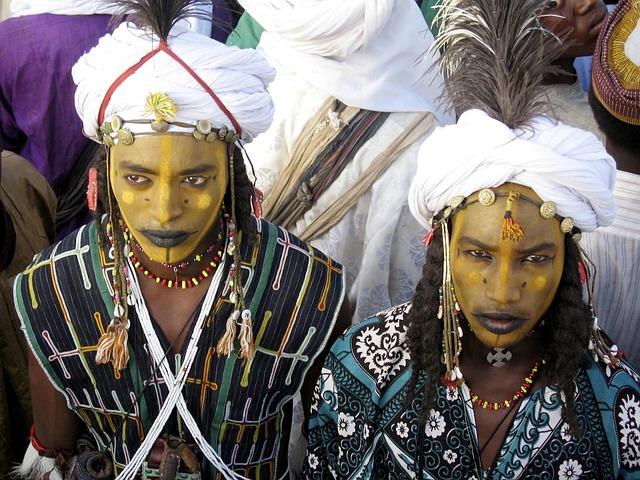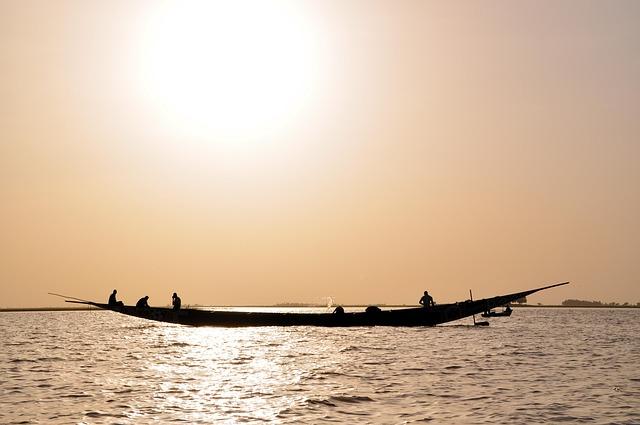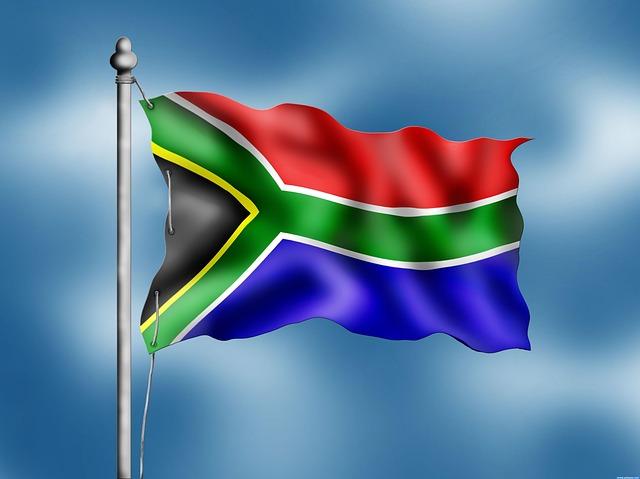In recent months, Niger has made headlines for its unexpected pivot towards Moscow, raising critical questions about the future of international relations in Africa and the strategic priorities of the United States on the continent. As Western influence encounters growing challenges, particularly in the wake of shifting alliances and security dynamics, Niger’s shift is emblematic of a broader trend observed in several African nations seeking partnerships that align with their interests. This development not only impacts Niger’s political landscape but also signals a potential recalibration of power in the region, prompting a reassessment of U.S. engagement in Africa. In this article, we will explore the implications of Niger’s turn toward Russia, the motivations behind this shift, and what it means for Washington’s strategy in Africa as it navigates a rapidly evolving geopolitical landscape.
Niger’s Strategic Shift towards Moscow and Its Implications for Regional Stability

The recent realignment of Niger towards Moscow marks a meaningful turning point in the geopolitical landscape of West Africa. Following a military coup that ousted the western-backed government, Niger’s new rulers have sought to strengthen ties with Russia, viewing it as a counterbalance to perceived Western imperialism. This strategic pivot could have lasting implications for regional stability, as it may embolden other nations to embrace similar partnerships, thereby altering the balance of influence in a region traditionally dominated by Western powers. Key factors driving this shift include:
- Security Cooperation: Russia’s perceived willingness to provide military support without the political strings attached often associated with Western assistance.
- Economic Opportunities: Potential for increased investment in Niger’s natural resources and infrastructure development through Russian state-owned enterprises.
- Ideological Alignment: A shared skepticism towards the West, fostering solidarity with Russia’s narrative of sovereignty and anti-colonialism.
The broader implications of Niger’s pivot may ripple throughout the Sahel region,challenging the ongoing counterterrorism efforts by Western nations. As Niger forges closer ties with Moscow, it could lead to a fragmented approach to security cooperation. Regional alliances may shift as neighboring countries reassess their relationships with both Niger and the West. If Moscow steps up its involvement, a potential reconfiguration of power dynamics in the region could emerge, characterized by increased proxy conflicts, a potential arms race, and a reluctance to support Western-led initiatives aimed at fostering democracy and stability. Notably, understanding the implications of this shift necessitates monitoring the key players involved:
| Country | Potential Response |
|---|---|
| Niger | Strengthening ties with Moscow for military and economic support. |
| France | Possibly reevaluating military presence and cooperation policies. |
| United States | Increased diplomatic engagement to prevent further shifts towards Russia. |
| ECOWAS | Potential response in imposing sanctions or fostering dialog. |
The Geopolitical Landscape: Understanding Russia’s Influence in West Africa

In recent years, Russia has been actively expanding its influence in West Africa, pivoting toward nations that are seeking alternatives to traditional Western partnerships. niger’s recent alignment with Moscow exemplifies this trend, wherein the government seeks military and economic support to bolster its national security and sovereignty. This shift reflects a broader pattern across the region, as several countries are drawn to Russia’s offers of arms sales, military training, and support for resource extraction, often accompanied by a rhetoric that resonates with anti-colonial sentiments. The implications of this pivot are significant, as Russia’s presence may undermine Western efforts to promote democratic governance and stability in a region historically fraught with conflict and volatility.
Moreover,the United States must reassess its strategic engagement in Africa,particularly in light of Russia’s increasing foothold. The U.S.has historically been a dominant player in facilitating economic development and stability through partnerships that promote democratic values; however,the allure of Russia’s no-strings-attached support poses a challenge. To effectively counterbalance Russian influence, the U.S. should consider strategies that focus on strengthening diplomatic ties, enhancing economic assistance, and supporting local governance initiatives. By prioritizing engagement that addresses the underlying issues of security and economic development,the U.S. can work towards rebuilding trust and influence in a region that is crucial to global stability.
- Military Cooperation: Arms sales and training programs.
- Economic Resources: Support for resource extraction without stringent conditions.
- Political Rhetoric: Resonance with anti-colonial sentiments.
- Diplomatic Engagement: Building strong, trust-based partnerships.
Assessing the Response: US Countermeasures to Niger’s Realignment

The shift in Niger’s allegiance towards Moscow has prompted a critical reassessment of U.S. foreign policy in West Africa. With a growing footprint of Russian influence, particularly through military cooperation and political alignment, the U.S. faces the challenge of recalibrating its strategy to safeguard its interests in the region. Key actions under consideration include:
- Reinforced Diplomatic Engagement: Increasing dialogues with both existing and new partners in Africa to bolster influence and counter Moscow’s sway.
- military Assistance Evolution: Redefining military support to Niger and neighboring countries, with a focus on capacity-building and readiness to address not only counter-terrorism but also regional stability.
- Economic Incentives: Expanding trade and investment opportunities aimed at building a resilient economic framework that can compete with Russia’s offers.
To effectively implement these countermeasures, the U.S.management is exploring a multi-faceted approach that blends diplomatic, military, and economic strategies. Understanding local dynamics and fostering grassroots connections will be crucial in establishing a favorable habitat for U.S. interventions. An overview of proposed countermeasures reveals a thorough strategy:
| Proposed Strategy | Description |
|---|---|
| Increased Military presence | Deploying additional military advisors to support local forces. |
| Economic Partnership Programs | Launching initiatives that support infrastructure and technology development. |
| Cultural and educational Exchanges | Promoting U.S. values and soft power through programs that foster mutual understanding. |
Future of US Engagement: Strategies for Effective Diplomacy in Africa

The shifting geopolitical landscape in Africa necessitates a recalibration of U.S. strategies to maintain influence and foster mutually beneficial relationships. To effectively engage with African nations, especially in light of Niger’s recent pivot towards Moscow, the U.S. must consider a multifaceted approach that prioritizes diplomatic versatility, economic investment, and cultural exchanges. Key components of this strategy could include:
- Strengthening Bilateral Relationships: focus on individualized diplomatic outreach to countries showing signs of alignment with choice powers.
- Enhancing Economic Partnerships: Invest in infrastructure and job creation initiatives that directly benefit local populations and improve the overall economic landscape.
- Promoting Democratic Values: Support grassroots movements and civil society organizations that advocate for democratic governance and human rights.
- Leveraging Technology: Facilitate tech exchange programs and cybersecurity partnerships to improve resilience against foreign influence.
Furthermore, collaboration with regional organizations such as the african Union or ECOWAS can amplify U.S. efforts in conflict resolution and stability promotion.It is indeed vital to understand the diverse needs and aspirations of African nations, which can be summarized in the following table:
| Country | Primary Need | U.S. engagement Chance |
|---|---|---|
| Niger | Security and Stability | Counterterrorism Training and Support |
| Nigeria | Economic Diversification | Investment in Renewable Energy |
| Kenya | Agricultural Conversion | Technology transfer Programs |
balancing Interests: Economic Opportunities Amidst Political Shifts

The recent political realignment in Niger has opened new avenues for economic engagement, inviting a complex interplay of interests from global powers. As the country strengthens ties with Moscow, there is a palpable urgency for the United States to reassess its approach to economic partnerships in the region. This shift presents both *challenges and opportunities* for U.S. policy-makers who must navigate a landscape characterized by competition and collaboration. Key areas for potential engagement include:
- Natural Resources: Niger is rich in uranium and gold, making its extraction sectors prime candidates for investment.
- Agriculture: Enhancing agricultural productivity through lasting practices could benefit local economies and stabilize food security.
- Infrastructure Development: Collaborating on infrastructure projects can facilitate trade and bolster regional integration.
However, moving forward requires that Washington not only addresses economic interests but also demonstrates a commitment to democratic governance and human rights. While engaging with Niger’s new leadership, a balanced approach that fosters dialogue and development initiatives could mitigate any backlash against perceived neocolonialism.Below is a succinct comparison of potential U.S. and Russian economic engagement strategies in Niger:
| Strategy | U.S. Approach | Russian Approach |
|---|---|---|
| Investment Focus | Democratic, sustainable sectors | Energy and military sectors |
| Partnership Style | Collaborative and clear | Authoritarian alignment |
| Long-term Goals | Stability and governance | Influence and resource access |
Building partnerships: Strengthening Alliances with African Nations in Transition

As African nations navigate complex political and economic landscapes,establishing strategic alliances has never been more critical. The recent trend of countries like Niger pivoting towards Moscow highlights the need for the United States to reassess its engagement strategy on the continent. Strengthening alliances with transitional governments requires a nuanced understanding of local dynamics, prioritizing economic cooperation and mutual respect over traditional power plays. The U.S. can forge meaningful partnerships by focusing on sustainable development initiatives, addressing security concerns, and actively involving local communities in the decision-making processes. This approach will not only rebuild trust but also solidify the U.S. presence in a region marked by shifting allegiances.
To capitalize on these transitions, American policymakers must embrace a flexible framework that supports democratic governance while recognizing the realities of military and economic pressures faced by these nations. Initiatives could include:
- Increased trade agreements that benefit both american businesses and local economies.
- Educational exchange programs that foster mutual understanding and bridge cultural gaps.
- Technical assistance in governance and infrastructure development to empower emerging leaders.
By adapting to the evolving landscape and promoting collaborative efforts, the United States can position itself as a vital partner in Africa’s journey toward stability and growth. A transparent dialogue with African nations about their aspirations and constraints is essential to ensure that partnerships are built on a foundation of trust and shared goals.
Future outlook
As Niger navigates its new geopolitical landscape following a pivot towards Moscow, the implications for U.S. engagement in Africa become increasingly complex. The shift not only represents a significant realignment in regional alliances but also poses challenges and opportunities for American foreign policy objectives across the continent.
For U.S.policymakers, understanding the motivations behind Niger’s decision, as well as the broader ramifications for West African stability, is crucial. The growing influence of Russia in the region, particularly amid rising anti-Western sentiments, necessitates a reevaluation of strategies to foster partnerships that prioritize democratic governance, economic development, and security cooperation.
Looking ahead, the U.S. must balance its historical ties with African nations while responding to the evolving dynamics of global power. Engaging with Niger and other nations moving towards Moscow will require a dedicated effort to address local concerns, strengthen bilateral relations, and promote multilateral frameworks that constrain external influence detrimental to regional stability.as the situation unfolds, it will be essential for stakeholders to monitor developments closely and adapt their approaches accordingly. The outcomes of Niger’s pivot could set significant precedents for U.S. engagement in Africa,shaping the continent’s future and redefining the international power balance in one of the world’s most strategically important regions.
Source link : https://afric.news/2025/03/14/nigers-pivot-to-moscow-whats-next-for-us-engagement-in-africa-foreign-policy-research-institute/
Author : Noah Rodriguez
Publish date : 2025-03-14 00:34:00
Copyright for syndicated content belongs to the linked Source.



